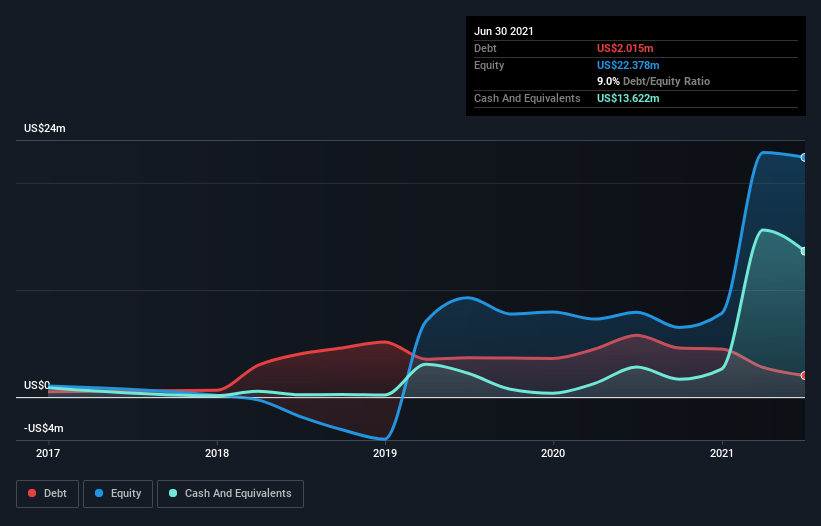- United States
- /
- Healthcare Services
- /
- NasdaqCM:BACK
Is IMAC Holdings (NASDAQ:IMAC) Using Debt In A Risky Way?

Howard Marks put it nicely when he said that, rather than worrying about share price volatility, 'The possibility of permanent loss is the risk I worry about... and every practical investor I know worries about.' It's only natural to consider a company's balance sheet when you examine how risky it is, since debt is often involved when a business collapses. We can see that IMAC Holdings, Inc. (NASDAQ:IMAC) does use debt in its business. But the real question is whether this debt is making the company risky.
What Risk Does Debt Bring?
Generally speaking, debt only becomes a real problem when a company can't easily pay it off, either by raising capital or with its own cash flow. Part and parcel of capitalism is the process of 'creative destruction' where failed businesses are mercilessly liquidated by their bankers. While that is not too common, we often do see indebted companies permanently diluting shareholders because lenders force them to raise capital at a distressed price. By replacing dilution, though, debt can be an extremely good tool for businesses that need capital to invest in growth at high rates of return. The first thing to do when considering how much debt a business uses is to look at its cash and debt together.
View our latest analysis for IMAC Holdings
What Is IMAC Holdings's Debt?
The image below, which you can click on for greater detail, shows that IMAC Holdings had debt of US$2.02m at the end of June 2021, a reduction from US$5.78m over a year. But on the other hand it also has US$13.6m in cash, leading to a US$11.6m net cash position.

How Strong Is IMAC Holdings' Balance Sheet?
The latest balance sheet data shows that IMAC Holdings had liabilities of US$5.44m due within a year, and liabilities of US$4.72m falling due after that. On the other hand, it had cash of US$13.6m and US$1.34m worth of receivables due within a year. So it actually has US$4.81m more liquid assets than total liabilities.
This surplus suggests that IMAC Holdings has a conservative balance sheet, and could probably eliminate its debt without much difficulty. Succinctly put, IMAC Holdings boasts net cash, so it's fair to say it does not have a heavy debt load! When analysing debt levels, the balance sheet is the obvious place to start. But it is future earnings, more than anything, that will determine IMAC Holdings's ability to maintain a healthy balance sheet going forward. So if you want to see what the professionals think, you might find this free report on analyst profit forecasts to be interesting.
In the last year IMAC Holdings had a loss before interest and tax, and actually shrunk its revenue by 7.1%, to US$13m. We would much prefer see growth.
So How Risky Is IMAC Holdings?
We have no doubt that loss making companies are, in general, riskier than profitable ones. And in the last year IMAC Holdings had an earnings before interest and tax (EBIT) loss, truth be told. Indeed, in that time it burnt through US$7.8m of cash and made a loss of US$5.2m. With only US$11.6m on the balance sheet, it would appear that its going to need to raise capital again soon. Even though its balance sheet seems sufficiently liquid, debt always makes us a little nervous if a company doesn't produce free cash flow regularly. There's no doubt that we learn most about debt from the balance sheet. But ultimately, every company can contain risks that exist outside of the balance sheet. To that end, you should learn about the 5 warning signs we've spotted with IMAC Holdings (including 2 which are significant) .
If, after all that, you're more interested in a fast growing company with a rock-solid balance sheet, then check out our list of net cash growth stocks without delay.
New: AI Stock Screener & Alerts
Our new AI Stock Screener scans the market every day to uncover opportunities.
• Dividend Powerhouses (3%+ Yield)
• Undervalued Small Caps with Insider Buying
• High growth Tech and AI Companies
Or build your own from over 50 metrics.
This article by Simply Wall St is general in nature. We provide commentary based on historical data and analyst forecasts only using an unbiased methodology and our articles are not intended to be financial advice. It does not constitute a recommendation to buy or sell any stock, and does not take account of your objectives, or your financial situation. We aim to bring you long-term focused analysis driven by fundamental data. Note that our analysis may not factor in the latest price-sensitive company announcements or qualitative material. Simply Wall St has no position in any stocks mentioned.
Have feedback on this article? Concerned about the content? Get in touch with us directly. Alternatively, email editorial-team (at) simplywallst.com.
About NasdaqCM:BACK
Medium-low with imperfect balance sheet.
Market Insights
Community Narratives




